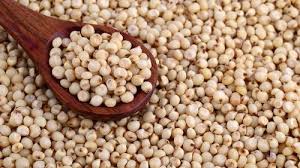![]()
If you’ve landed on this article page, you’re probably searching for a
good business idea—an idea that’s light on the pocket but heavy on
returns, promising both a fulfilling journey and potential profit.
|
How to Start a Profitable Sorghum Business in Nigeria
Sorghum farming is a lucrative agricultural venture in Nigeria.
This grain crop is widely cultivated and has a high demand both
locally and internationally.
Nigeria is the second largest producer of sorghum, with the
majority of domestic production used for household
consumption/fodder. However, since the ban on the importation of
malted barley used in the production of beverages, companies
have been forced to use sorghum as a raw material and this
report seeks to expose the investment opportunity in the supply
of the product to local industries in Nigeria through this
feasibility report.
A major portion of sorghum grain currently utilized by Nigeria
industries {approximately 200,000 MT} is used by the larger beer
sector, followed by the non-alcoholic malt beverage sector.
Currently, several brands of larger beer with major sorghum
content are being marketed.
There are more than 20 breweries operating in Nigeria with an
annual production capacity close to 20 million hectoliters.
The use of sorghum malt was encouraged by a ban on imported
barley malt and an economic recession, resulting in a
substantial reduction in the sales and production of barley
based beer.
The return on investment on the local trading of sorghum is
estimated between 15%- 20%.
Before starting any business, it is essential to conduct
thorough market research. Understand the current demand for
sorghum in Nigeria and identify potential buyers, such as
breweries, food processing companies, and livestock feed
manufacturers. Study market trends, pricing, and competition to
make informed decisions.
Acquiring Land for Sorghum Farming: Identify suitable land for
sorghum cultivation. The soil should be fertile, well-drained,
and preferably located in areas with adequate rainfall or access
to irrigation. Leasing or purchasing farmland depends on your
budget and long-term plans.
Seed Selection: Choose high-quality sorghum seeds suitable for
the specific agro-ecological zone you are farming in. Consider
factors such as yield potential, disease resistance, and market
demand. Purchase seeds from reputable suppliers or government
agricultural agencies to ensure quality.
Soil Preparation: Prepare the land by clearing weeds, plowing,
and harrowing. Conduct soil tests to determine nutrient
deficiencies and pH levels. Amend the soil with organic matter
or fertilizers as recommended to ensure optimal growing
conditions for sorghum.
Irrigation and Water Management: Implement appropriate
irrigation methods to ensure consistent moisture levels
throughout the growing season. Irrigation can be done using
sprinklers, drip systems, or other suitable techniques.
Efficient water management is critical for the success of your
sorghum crop.
Weed Control: Implement
effective weed control strategies to minimize competition for
resources and maximize yields. Manual weeding, herbicides, or
mulching can be used to manage weeds. Regular monitoring is
necessary to address weed infestations promptly.
Pest and Disease Management: Identify common pests and diseases
that affect sorghum in Nigeria. Implement integrated pest
management practices, which include cultural, biological, and
chemical control methods. Regular scouting, crop rotation, and
the use of resistant varieties are essential for pest and
disease management.
Fertilizer Application: Sorghum requires essential nutrients for
optimal growth. Conduct soil tests to determine the nutrient
requirements of your crop. Apply fertilizers according to the
results and recommended rates. Consider organic sources of
nutrients, such as compost or manure, for sustainable farming
practices.
Crop Monitoring and Maintenance: Regularly monitor your sorghum
crop for signs of nutrient deficiencies, pests, diseases, or any
other issues. Maintain proper crop hygiene, remove diseased
plants promptly, and take appropriate action to prevent the
spread of diseases. Timely interventions can help protect your
yield.
Harvesting Sorghum:
Harvest sorghum when the grains are fully mature and dry.
Monitor the moisture content to ensure it meets the desired
standards for storage and processing. Use appropriate harvesting
equipment, such as combine harvesters or sickles, to efficiently
harvest the crop.
Drying and Storage: Properly dry the harvested sorghum to reduce
moisture content and prevent spoilage. Spread the grains in thin
layers and ensure good airflow. Store the dried sorghum in
clean, moisture-free containers such as silos or sacks to
maintain quality.
Sorghum Processing:
Explore value-added opportunities by processing sorghum into
various products such as flour, malt, or snacks. Evaluate the
market demand for these products and invest in processing
machinery accordingly. This can significantly increase your
profitability.
Packaging and Branding:
Develop an appealing brand for your sorghum products. Invest in
quality packaging materials that protect the grains and maintain
freshness. Create a recognizable brand identity to stand out in
the market and attract customers.
Developing Distribution
Channels: Identify distribution channels to reach your target
market effectively. Build relationships with wholesalers,
retailers, and other potential buyers. Utilize both offline and
online platforms to expand your customer base and make your
products readily available.
Marketing Strategies: Implement various marketing strategies to
promote your sorghum business. This can include participating in
trade fairs, advertising in agricultural publications,
leveraging social media, and collaborating with food bloggers or
nutritionists to raise awareness about the nutritional benefits
of sorghum.
Building Partnerships: Collaborate with other stakeholders in
the sorghum value chain, such as farmers' associations, research
institutions, or government agencies. Networking and
partnerships can provide access to valuable resources, knowledge
sharing, and marketing opportunities.
The harvest season for sorghum is typically between September
and November, about 3-4 months after planting, depending on the
variety and the planting location. It is important to note that
the timing of planting and harvesting may vary based on local
weather conditions, soil type, and other factors.
Financial Management: Develop a sound financial management
system to track income, expenses, and profitability. Proper
financial management helps you make informed decisions, identify
areas for cost reduction, and secure funding for expansion or
equipment acquisition.
Scaling Up Your Sorghum
Business: Evaluate your business performance regularly and
identify opportunities for growth and expansion. Consider
increasing your sorghum cultivation area, diversifying your
product range, or exploring export markets. Strategic planning
and continuous improvement are key to scaling up successfully.
Sustainable Farming Practices: Adopt sustainable farming
practices to protect the environment and promote long-term
profitability. Implement measures to conserve water, reduce
chemical inputs, promote biodiversity, and improve soil health.
Sustainable practices can also be a selling point for
environmentally conscious consumers.
Continuous Marketing Efforts: Maintain consistent marketing
efforts to keep your sorghum business visible in the market.
Engage in online and offline promotional activities, collaborate
with influencers or brand ambassadors, and leverage social media
platforms to reach a wider audience.
Investing in Packaging and Labeling: Invest in attractive and
informative packaging for your sorghum products. Labeling should
include important information such as nutritional facts,
certification logos, and contact details. Packaging and labeling
contribute to the overall perceived value of your products.
Overall, sorghum farming has become an important agricultural
activity in Nigeria
due to its versatility, resilience, and economic potential. The
crop has the potential to improve food security, generate income
for farmers, and contribute to the growth of the agricultural
sector in the region.
Sorghum farming has significant potential for Nigeria and
Africa, with many benefits such as its drought resistance,
versatility in use, and high nutritional value. As a result, the
demand for sorghum is increasing globally, which presents an
opportunity for Nigerian and African farmers to increase their
income through exportation.
Get our Practical Training Guide on how to start a profitable Sorghum Business in Nigeria. In this comprehensive guide, we will walk you through the steps to start a profitable sorghum business in Nigeria, from planning and preparation to marketing and sales.
|







